Related Research Articles

Historical negationism, also called historical denialism, is falsification or distortion of the historical record. It should not be conflated with historical revisionism, a broader term that extends to newly evidenced, fairly reasoned academic reinterpretations of history. In attempting to revise the past, historical negationism acts as illegitimate historical revisionism by using techniques inadmissible in proper historical discourse, such as presenting known forged documents as genuine, inventing ingenious but implausible reasons for distrusting genuine documents, attributing conclusions to books and sources that report the opposite, manipulating statistical series to support the given point of view, and deliberately mistranslating texts.

Genocide denial is the attempt to deny or minimize the scale and severity of an instance of genocide. Denial is an integral part of genocide and includes the secret planning of genocide, propaganda while the genocide is going on, and destruction of evidence of mass killings. According to genocide researcher Gregory Stanton, denial "is among the surest indicators of further genocidal massacres".
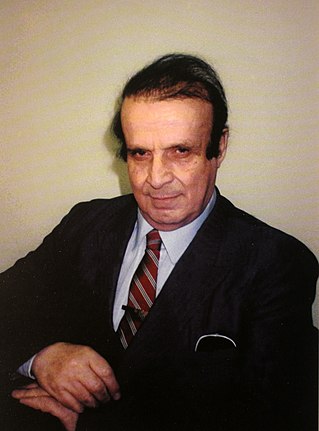
Vahakn Norair Dadrian was an Armenian-American sociologist and historian, born in Turkey, professor of sociology, historian, and an expert on the Armenian genocide.
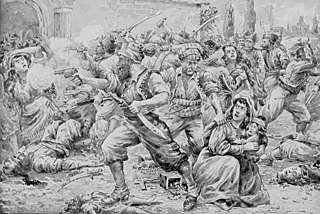
Anti-Armenian sentiment, also known as anti-Armenianism and Armenophobia, is a diverse spectrum of negative feelings, dislikes, fears, aversion, racism, derision and/or prejudice towards Armenians, Armenia, and Armenian culture.

Diplomatic relations between Armenia and Turkey are officially non-existent and have historically been hostile. Whilst Turkey recognised Armenia shortly after the latter proclaimed independence in September 1991, the two countries have failed to establish diplomatic relations. In 1993, Turkey reacted to the war in Nagorno-Karabakh by closing its border with Armenia out of support for Azerbaijan.

Armenian genocide denial is the claim that the Ottoman Empire and its ruling party, the Committee of Union and Progress (CUP), did not commit genocide against its Armenian citizens during World War I—a crime documented in a large body of evidence and affirmed by the vast majority of scholars. The perpetrators denied the genocide as they carried it out, claiming that Armenians in the Ottoman Empire were resettled for military reasons, not exterminated. In the genocide's aftermath, incriminating documents were systematically destroyed, and denial has been the policy of every government of the Republic of Turkey, as of 2023, and later adopted by the Republic of Azerbaijan, as of 1991.
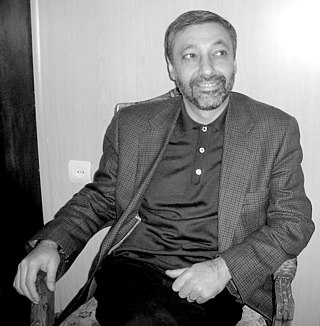
Alexander Arzumanyan is Armenia's first ambassador to the United States and to the United Nations. He served as minister of foreign affairs from 1996 until his resignation, with President Levon Ter-Petrosyan, in 1998. Since then, he has been involved in local politics, as chairman of the Armenian national liberation movement (2000–2002), and in the private sector, as chief advisor to the president of Armagrobank (1998–2000). At present, he works with local NGOs in the area of human rights, democracy, and regional cooperation, and is a founding member of the Turkish Armenian Reconciliation Commission, an independent group of prominent Armenians and Turks. The TARC was established in July 2001 to promote mutual understanding and good will between the people of Armenia and Turkey, and to encourage improved relations between the countries. In July 2002, the TARC commissioned a groundbreaking legal analysis regarding the applicability of the United Nations Convention on the Prevention and Punishment of the Crime of Genocide to the Armenian Genocide from the New York-based International Center for Transitional Justice.

Operation Nemesis was a program to assassinate both Ottoman perpetrators of the Armenian genocide and officials of the Azerbaijan Democratic Republic most responsible for the massacre of Armenians during the September Days of 1918 in Baku. Masterminded by Shahan Natalie, Armen Garo, and Aaron Sachaklian, it was named after the Greek goddess of divine retribution, Nemesis.

The Istanbul trials of 1919–1920 were courts-martial of the Ottoman Empire that occurred soon after the Armistice of Mudros, in the aftermath of World War I.
Impunity is the ability to act with exemption from punishments, losses, or other negative consequences. In the international law of human rights, impunity is failure to bring perpetrators of human rights violations to justice and, as such, itself constitutes a denial of the victims' right to justice and redress. Impunity is especially common in countries which lack the tradition of rule of law, or suffer from pervasive corruption, or contain entrenched systems of patronage, or where the judiciary is weak or members of the security forces are protected by special jurisdictions or immunities. Impunity is sometimes considered a form of denialism of historical crimes.

Armenian genocide recognition is the formal acceptance that the systematic massacres and forced deportation of Armenians committed by the Ottoman Empire from 1915 to 1923, during and after the First World War, constituted genocide.
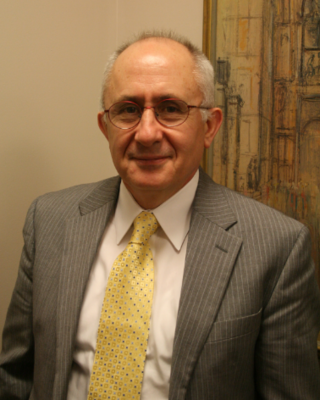
Altuğ Taner Akçam is a Turkish-German historian and sociologist. During the 1990s, he was the first Turkish scholar to acknowledge the Armenian genocide, and has written several books on the genocide, such as A Shameful Act (1999), From Empire to Republic: Turkish Nationalism and the Armenian Genocide (2004), The Young Turks' Crime Against Humanity (2012), and Killing Orders (2018). He is recognized as a "leading international authority" on the subject. Akçam's frequent participation in public debates on the legacy of the genocide have been compared to Theodor Adorno's role in postwar Germany.
The issue of Armenian genocide reparations derives from the Armenian genocide of 1915 committed by the Ottoman Empire. Such reparations might be of financial, estate or territorial nature, and could cover individual or collective claims as well as those by Armenia. The majority of scholars of international law agree that Turkey is the successor state or continuation of the Ottoman Empire. In addition, the Republic of Turkey continued the Ottoman Empire's internationally wrongful acts against Armenians, such as confiscation of Armenian properties and massacres. Former Secretary of the UN Human Rights Committee, Professor Alfred de Zayas, Geneva School of Diplomacy, stated that "[b]ecause of the continuing character of the crime of genocide in factual and legal terms, the remedy of restitution has not been foreclosed by the passage of time".

The confiscation of Armenian properties by the Ottoman and Turkish governments involved seizure of the assets, properties and land of the country's Armenian community. Starting with the Hamidian massacres and peaking during the Armenian genocide, the confiscation of the Armenian property lasted continuously until 1974. Much of the confiscations during the Armenian genocide were made after the Armenians were deported into the Syrian Desert with the government declaring their goods and assets left behind as "abandoned". Virtually all properties owned by Armenians living in their ancestral homeland in Western Armenia were confiscated and later distributed among the local Muslim population.

In Turkey, xenophobia and discrimination are present in its society and throughout its history, including ethnic discrimination, religious discrimination and institutional racism against non-Muslim and non-Sunni minorities. This appears mainly in the form of negative attitudes and actions by some people towards people who are not considered ethnically Turkic, notably Kurds, Armenians, Arabs, Assyrians, Greeks, Jews, and peripatetic groups like Romani people,Domari, Abdals and Lom.

Garo Paylan is a politician from Turkey and one of the country's leading democracy activists. Paylan was among the few Armenians elected to the Grand National Assembly of Turkey and served for two consecutive terms in 2015–2018 and 2018–2023, representing Istanbul and Diyarbakir. He is a founding member of the Peoples' Democratic Party (HDP) and since 2016 was the first Armenian in the history of the Republic of Turkey to publicly discuss the Armenian genocide of 1915 from the podium of the Turkish parliament. Paylan is recognized for his activism on human rights and minority rights in Turkey and has been the recipient of several awards, including the Grand Vermeil Medal and has been twice nominated for the Nobel peace prize.
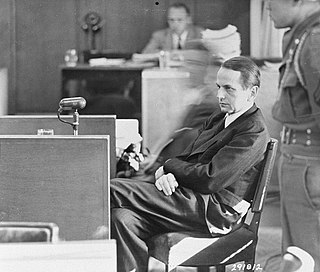
Genocide justification is the claim that a genocide is morally excusable/defensible, necessary, and/or sanctioned by law. Genocide justification differs from genocide denial, which is the attempt to reject the occurrence of genocide. Perpetrators often claim that genocide victims presented a serious threat, justifying their actions by stating it was legitimate self-defense of a nation or state. According to modern international criminal law, there can be no excuse for genocide. Genocide is often camouflaged as military activity against combatants, and the distinction between denial and justification is often blurred.

The relationship between the Armenian genocide and the Holocaust has been discussed by scholars. The majority of scholars believe that there is a direct causal relationship between the Armenian genocide and the Holocaust, however, some of them do not believe that there is a direct causal relationship between the two genocides.
The terminology of the Armenian genocide is different in English, Turkish, and Armenian languages and has led to political controversies around the issue of Armenian genocide denial and Armenian genocide recognition. Although the majority of historians writing in English use the word "genocide", other terms exist.

Right to truth is the right, in the case of grave violations of human rights, for the victims and their families or societies to have access to the truth of what happened. The right to truth is closely related to, but distinct from, the state obligation to investigate and prosecute serious state violations of human rights. Right to truth is a form of victims' rights; it is especially relevant to transitional justice in dealing with past abuses of human rights. In 2006, Yasmin Naqvi concluded that the right to truth "stands somewhere on the threshold of a legal norm and a narrative device ... somewhere above a good argument and somewhere below a clear legal rule".